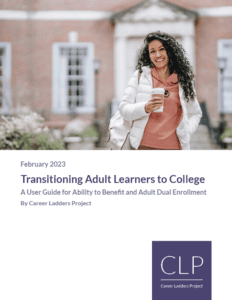 The good news is that students in California can attend a community college without a high school diploma or its equivalency. In California, unlike most other states, the door to college attainment— and jobs that provide family-sustaining wages with greater potential for economic mobility—is open for adults who have not yet earned a high school diploma/equivalency. However, the unfortunate reality is that students who lack financial resources may not be able to walk through that door because adults without a secondary credential do not readily qualify for many forms of financial aid.
The good news is that students in California can attend a community college without a high school diploma or its equivalency. In California, unlike most other states, the door to college attainment— and jobs that provide family-sustaining wages with greater potential for economic mobility—is open for adults who have not yet earned a high school diploma/equivalency. However, the unfortunate reality is that students who lack financial resources may not be able to walk through that door because adults without a secondary credential do not readily qualify for many forms of financial aid.
But a remedy is available. Adults without a high school diploma/equivalency can be eligible for federal financial aid, including Pell grants, if they use a special provision in federal law called Ability to Benefit (ATB). Furthermore, California recently passed legislation in 2019 that allows adult students who are enrolled in a GED® or high school diploma equivalency program to register for community college as dual enrollment students. Dual enrollment allows adult students to start college, often tuition-free. Unfortunately, there are few intentional dual enrollment programs to support both secondary and postsecondary credentialing; more are urgently needed.
By opening dual enrollment to adults without a high school diploma/equivalency, California is uniquely positioned to support adult students, their families, and communities. Using ATB and adult dual enrollment in tandem, we can accelerate adult students without a secondary credential toward college attainment and provide financial support toward that goal. For students on the economic margins, this can mean all the difference in certificate and degree attainment.
Prepared by Career Ladders Project
February 2023
Updated April 2024
-
- Updated link to Ability To Benefit User Guide online resources
- Updated navigation link from Creating an Adult Education Partnership: Strategies for Coordinators to Adult Dual Enrollment Planning Tool